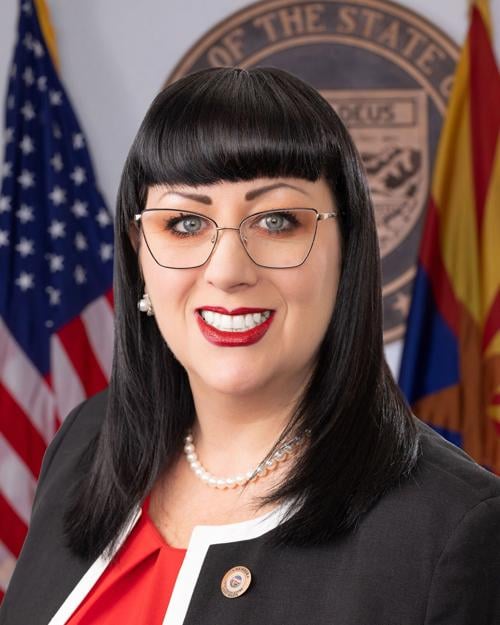PHOENIX — State senators gave preliminary approval Thursday to a measure directing the Education Department to come up with a list of books to ban in public schools.
And it wouldn’t just include lewd or sexual materials.
SB1700 would require the department, now headed by elected Republican Superintendent of Public Instruction Tom Horne, to also include on that list materials that “promote gender fluidity or gender pronouns.’’
The measure includes similar language on what local school boards and school libraries would be required to remove from shelves.
“Parents want to make sure that their children who are innocent, who are impressionable, get to have and hold onto that innocence that they have,’’ said Sen. Justine Wadsack, R-Tucson, sponsor of the measure.
“They don’t need to be reading about their best friend’s erection and what it felt like in their hand,’’ she said. “I’m tired of the normalizing of this perversion.’’
Wadsack’s measure would apply to all K-12 grades in public and charter schools.
“Children should not be thinking of these things when they’re in K through 12,’’ she told colleagues. “There’s plenty of time for this when they get to college and when they’re outside the purview of their parents.’’
There was some debate on exactly where the line should be.
Sen. Christine Marsh, D-Phoenix, who is a teacher, said there is content “too graphic for the classroom.’’
“But there’s also no room in the classroom or in libraries for banning books simply because it upsets one group of people at the expense of so many others,’’ she said.
Marsh said what is likely to be banned are the books that reflect experiences of those not in the mainstream, including gay children and victims of sexual abuse. She said it’s important that these books be available not only to ensure these children see themselves in literature but also so that others develop empathy for them.
Of particular concern to some was the language on excising materials about gender fluidity and pronouns. Erica Keppler, an activist in the LGBTQ community, told lawmakers that the language in the bill about “promoting’’ either makes no sense.
“Gender fluidity is a naturally occurring phenomenon that some people experience,’’ no different than being left handed or having curly hair, and something that cannot be “promoted,” Keppler said.
She objected to it being lumped in with other subjects that would get books on the banned list. “It’s ridiculous and demeaning to include ‘gender fluidity’ in the same sentence as ‘pedophilia,’ ‘’ she said.
Elijah Watson, a citizen who testified at a hearing, said he feared the parameters for the Education Department to decide what’s not allowed in schools is so broad that it would lead to banning “To Kill a Mockingbird,’’ “The Great Gatsby,’’ “Of Mice and Men’’ and “The Color Purple.’’
But Lisa Fink of the Protect Arizona Children Coalition said her group is more concerned about books she said have shown up in the libraries of the Kyrene and Deer Valley school districts, like “It’s Perfectly Normal.’’
Designed for children age 10 and up, that book addresses sexual health and contains sections on puberty, pregnancy and sexual orientation and includes pictures of naked people.
Anastasia Tsatsakis, who lost her bid in November to be on the Vail Unified School District Governing Board, complained about “The Absolutely True Diary of a Part-Time Indian,’’ a book about a child from the Spokane Indian Reservation’s decision to go to a nearly all-white public high school away from the reservation.
That objection caught the attention of Sen. Sally Ann Gonzales, D-Tucson.
“I read this book with my grandchildren,’’ Gonzales said. “It’s a wonderful book.’’
Tsatsakis said she has nothing against Native Americans but objected to references to masturbation and rape. She said excerpts were read during a school board meeting. “I was hoping in the room no one had a small child present because what is in that book is so foul,’’ Tsatsakis said.
“I appreciate that was your choice to read it with them,’’ she told Gonzales. “It should be a parental choice in a personal environment, not in a school district.’’
Existing law already bars public schools from referring students to, or using, any sexually explicit materials, said Chris Kotterman, lobbyist for the Arizona School Boards Association.
That law does have exceptions if materials have “serious educational value for minors’’ or possess “serious literary, artistic, political or scientific value.’’
Even then, however, schools must get prior written consent from parents for each such book or article. Students who don’t get consent have to be provided with an alternative assignment.
Under Wadsack’s bill, the state Education Department would review and unilaterally decide for all schools which books are acceptable and which are not.
“This is an unprecedented state control of curriculum, the likes of which we haven’t seen before in Arizona,’’ Kotterman said.
He noted the role politics play. “Just this past year, the agency was headed by a Democrat,’’ he reminded lawmakers, referring to Kathy Hoffman, who lost her November bid for reelection as superintendent of schools to Horne.
“It will undoubtedly change hands again,’’ Kotterman said. “That list will be subject to curation by people who work for that individual.’’
Marsh had her own take on what will happen once the Education Department posts a list on its website of what is considered inappropriate.
“That’s what kids are going to read,’’ she said.
Wadsack said her measure is not an attack on the LGBTQ community.
“I have a gay son,’’ she told colleagues. But Wadsack said she has not approved any books that “would be wrong for him.’’
The measure still needs a final roll-call vote in the Senate before going to the House.
Get your morning recap of today's local news and read the full stories here: tucne.ws/morning






